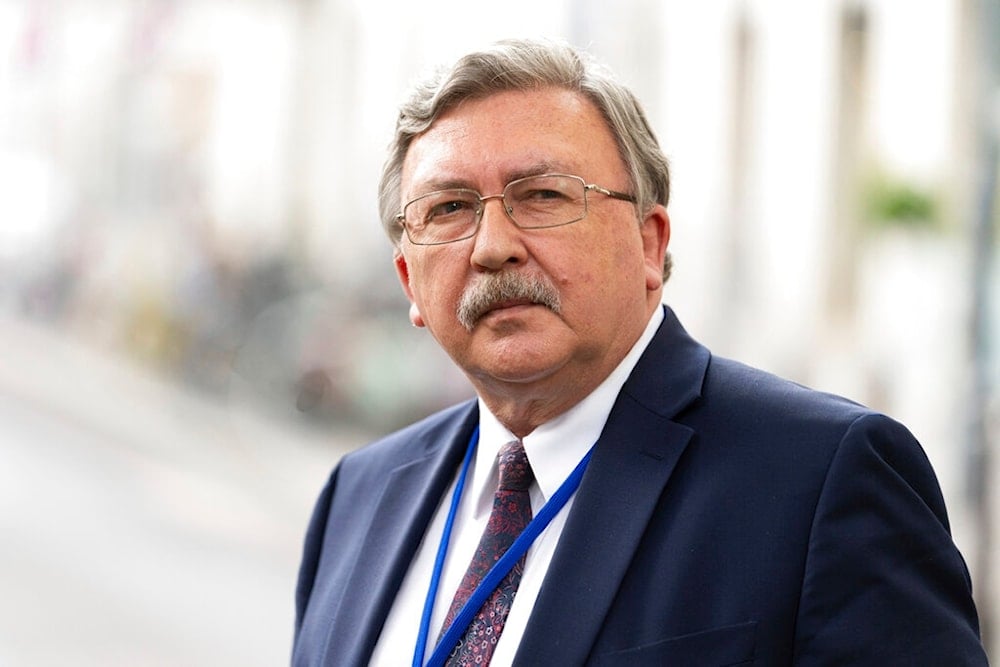Iran has right to respond to West's 'hostile' actions: Russian envoy
In an interview with Tasnim, Mikhail Ulyanov discusses Russia's stance on the Iranian nuclear issue, its implications and repercussions.
-

Russia's Governor to the International Atomic Energy Agency (IAEA), Mikhail Ulyanov, addresses the media near the 'Grand Hotel Vienna' where closed-door nuclear talks take place in Vienna, Austria, on Saturday, June 12, 2021 (AP)
Russia's permanent representative to international organizations in Vienna reaffirmed Iran's right to respond to what he described as "politically motivated" actions by Western nations, following the European Troika’s resolution against Tehran at the UN nuclear agency.
In a written interview with Tasnim, Mikhail Ulyanov discussed Russia’s stance on the dynamics of cooperation between Iran and the International Atomic Energy Agency (IAEA).
He also shared Russia’s perspective on the recent actions taken by France, the UK, Germany, and the US, which resulted in the IAEA Board of Governors adopting a new resolution against Iran on November 21.
'Politically shortsighted'
Ulyanov strongly criticized the European Troika (E3) and the United States for drafting a resolution against Iran without considering recent agreements between Tehran and the IAEA.
When asked why the resolution was pushed forward before the IAEA Director General's return from Iran, Ulyanov described the move as "politically shortsighted", highlighting its disregard for broader diplomatic efforts.
He emphasized that the resolution undermines IAEA chief Rafael Grossi’s efforts to establish a constructive dialogue with Iran’s new administration and resolve outstanding issues.
"It is even more regrettable that E3 and the USA decided to move forward with the resolution despite the fact that Director General Grossi brought concrete agreements from Iran, which were reflected in his relevant reports to the IAEA Board of Governors," Ulyanov noted.
Explaining Russia's stance against the resolution, Ulyanov outlined two primary objections:
1. Political irrelevance and potential escalation
He argued that the resolution is untimely and could jeopardize cooperation between Iran and the IAEA, potentially escalating tensions surrounding the Iranian nuclear issue.
With the Middle East already plagued by conflicts, he stated that the move only adds fuel to fire, noting that the Iranian government has demonstrated openness to dialogue and cooperation, making the resolution counterproductive.
2. Undermining the IAEA’s safeguards mechanism
Ulyanov criticized the resolution's request for the IAEA Director General to prepare an updated assessment of Iran’s nuclear program, calling it detrimental to the integrity of the Safeguards mechanism.
"Virtually, any country can become a victim of such approach while Safeguards mechanism is supposed to be transparent, objective and impartial," he warned.
Impact on Iran-IAEA relations
Addressing the potential implications of the resolution, Ulyanov stated that Iran has the right to respond to such "politically motivated" actions.
He referenced Iran’s plans to expand its enrichment capabilities as a direct reaction. However, he expressed hope that Iran would prioritize maintaining cooperation with the IAEA to address unresolved issues based on recent agreements with Grossi.
The resolution, adopted by the IAEA’s Board of Governors on November 21, has sparked criticism from Russia, which views it as a move that could derail diplomatic progress and exacerbate regional instability.
A meeting was convened in Geneva on Friday bringing together Iran and the European Troika group, made up of France, Germany, and the UK, for their Deputy Foreign Ministers to discuss the Iranian nuclear file and the recent sanctions imposed on Iran by the European Union.
A senior Iranian official told Reuters that Iran expects talks with European powers in Geneva to be “difficult and serious”, adding that Russia and China will be briefed on the meeting's outcomes next week.
Read more: Iran urges EU to halt arrogant, irresponsible behavior

 4 Min Read
4 Min Read








